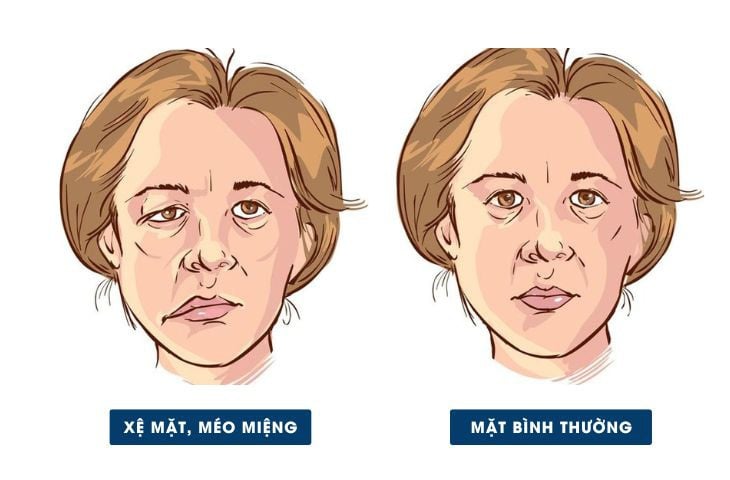
Bell's palsy not only affects aesthetics but also affects communication ability - Illustration photo
Peripheral facial nerve palsy due to cold, stroke
On his personal page, actor LT shared a photo of the actor undergoing facial acupuncture to treat peripheral facial nerve palsy, causing many viewers to worry.
Actor LT shared that he experienced this condition due to catching a cold and windstroke: "After wandering around asking for directions in Da Lat, the next morning my shoulder was stiff and it spread to the left side of my face."
He also said: "I don't know what to advise my followers. I just wish everyone peace and early detection of symptoms such as stroke, nerve paralysis, or apoplexy... for timely treatment."
Previously, singer DHY also shared that she had peripheral facial nerve paralysis, causing her face to be crooked.
"After filming that night, I went straight to the emergency room. My mind was spinning, so many thoughts were running through my head. For someone in my profession, my face is extremely important," the singer recounted.
Peripheral facial nerve palsy is not uncommon, especially when the weather changes, catching a cold, or getting a stroke. As in the case of actor LT, he also shared that it was due to catching a cold or getting a stroke.
Need to quickly recognize symptoms
According to Dr. Hoang Duy Luan, Department of Traditional Medicine, Bach Mai Hospital, peripheral facial nerve palsy (facial paralysis) is a syndrome of damage to the facial nerve. This causes a decrease or loss of movement of the facial muscles (paralysis of the entire half of the face).
Doctors say that up to 80% of the causes of facial nerve palsy are due to sudden cold or windstroke.
In addition, the disease is also caused by many other reasons that cause the nerve to be compressed, leading to swelling. Or due to inflammatory diseases such as mastoiditis but not treated promptly, leading to complications, shingles virus, trauma, or impact from surgery in the temporal region, mastoid region, face or ear.
"Symptoms of peripheral facial nerve palsy are easily recognizable and commonly range from partial weakness to complete paralysis of one side of the face, progressing over several hours or days.
In addition, common symptoms that can be recognized include eyes that cannot close completely, watery eyes; reduced or lost forehead wrinkles, nasolabial folds. When rinsing the mouth, water will flow out of the corner of the mouth on the paralyzed side, food will get stuck between the teeth and cheeks.
Numbness in half of the face, around the jaw or behind the ear. Headache, increased sense of sound in the affected ear. Decreased taste in the anterior 2/3 of the tongue on the affected side with decreased salivation and tears," Dr. Luan stated.
This expert also said that peripheral facial nerve palsy needs to be detected early and treated promptly and properly, otherwise it will take a long time to heal and cause other complications such as eye complications.
Patients may have corneal ulcers, conjunctivitis, ectropion, synkinesis (a condition in which involuntary muscles coordinate with voluntary activities such as closing the eyes when eating or laughing), hemifacial spasm with paralysis, and tearing while eating, also known as crocodile tears syndrome.
How to prevent disease?
Doctor Luan recommends that peripheral facial nerve palsy is easy to prevent. People should exercise every day to help improve blood circulation.
Do not shower late, especially in winter. After showering, dry your hair before going to bed or going out. If you have to travel long distances by train or car, close the car doors and wear a mask to avoid strong winds blowing into your face. Have regular health check-ups to detect and support early treatment of diseases that can cause Bell's palsy.
In particular, when there are signs of pain, numbness, and loss of sensation on one side of the face, patients need to quickly go to medical facilities for timely examination and treatment.
Source: https://tuoitre.vn/nhiem-lanh-trung-gio-nguy-co-dan-den-liet-day-than-kinh-so-7-ngoai-bien-20250503185748442.htm


![[Photo] Solemn opening of the 9th Session, 15th National Assembly](https://vphoto.vietnam.vn/thumb/1200x675/vietnam/resource/IMAGE/2025/5/5/ad3b9de4debc46efb4a0e04db0295ad8)
![[Photo] President Luong Cuong presided over the welcoming ceremony and held talks with Sri Lankan President Anura Kumara Dissanayaka](https://vphoto.vietnam.vn/thumb/1200x675/vietnam/resource/IMAGE/2025/5/5/bbb34e48c0194f2e81f59748df3f21c7)
![[Photo] President Luong Cuong and Sri Lankan President Anura Kumara Dissanayaka visit President Ho Chi Minh relic site](https://vphoto.vietnam.vn/thumb/1200x675/vietnam/resource/IMAGE/2025/5/5/0ff75a6ffec545cf8f9538e2c1f7f87a)



















































































Comment (0)